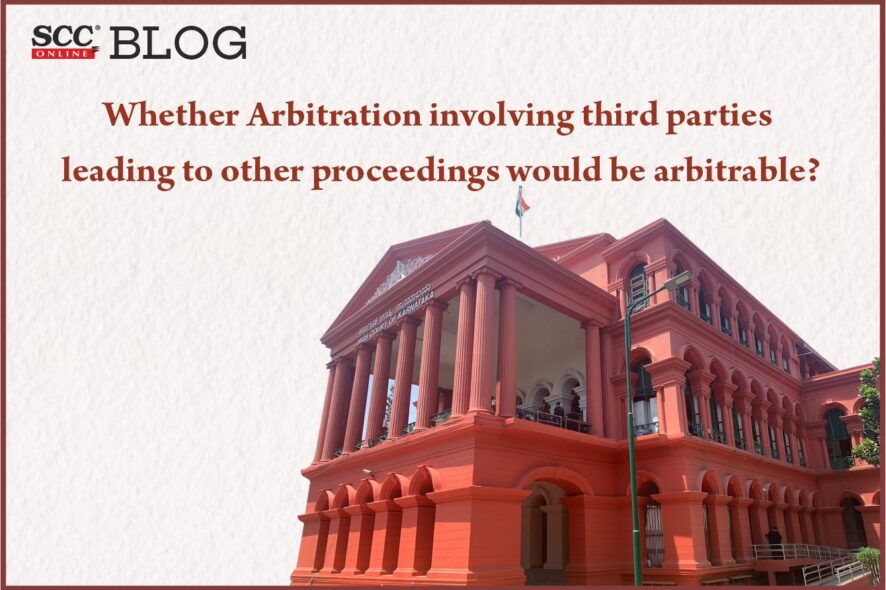Karnataka High Court: B.M. Shyam Prasad, J., held that there cannot be a complete adjudication of the petitioner’s rights unless the third parties are also heard.
In the present matter, the petitioner was a society registered under the Karnataka Societies Registration Act, 1960 and first respondent was a company registered under the Companies Act, 1956 engaged in the business of real estate development and construction of multi-storied apartments.
Further, the second respondent was a company registered under Section 25 of the Companies Act.
What is the Dispute?
The dispute was with regard to handing over vacant possession of certain apartments constructed in the property situated at Norris Road, Municipal ward No. 76, Richmond Town, Bengaluru. [Subject Property]
The said building was constructed by the first respondent in performance of the terms of the Joint Development Agreement and the Supplemental Agreement of even date. The said agreements were executed and registered amongst the petitioner and respondents.
The J.D. Agreement was executed contemporaneously with a Power of Attorney. The said agreement provided for the resolution of disputes/difference amongst the parties.
As per the terms of the JD Agreement, the second respondent was the owner of the subject property with the petitioner being described as the Administrative Trustee managing the affairs of the subject property, and the revenue records for the subject property were made in the respondent’s name.
A dispute arose between the parties with respect to the allotment of the apartments. Hence the petitioner had filed a petition under Sections 11(4) and 11(6) of the Arbitration and Conciliation Act, 1996.
Analysis, Law and Decision
Firstly, the High Court referred to the Supreme Court decision in Vidya Drolia v. Durga Trading Corpn., (2021) 2 SCC 1.
The respondent’s objection to the reference of the dispute to arbitration was on multiple grounds such as that the dispute was essentially between two trusts, because of the fraud that was played by the first respondent in tandem with Sri Michael Sreenivasan, the dispute was time-barred, the parties did not agree upon mandatory arbitration and the dispute could not be just amongst the parties to the present petition.
Further, the respondent contended that certain third parties entered into the shoes of the petitioner with the assignment of their respective rights in the subject apartments in favour of third parties and therefore, the claim was non-arbitrable.
High Court stated that the proceeding under Section 11 of the Arbitration Act is not a stage for the Courts to enter into a mini-trial.
It emerged from the facts that the dispute was about the delivery of 3 apartments. The petitioner and the respondents entered into MOUs with third persons agreeing to assign their rights in the said apartments in favour of Kaveri Bai and Sudhir Jaganathan Kamath, who were not parties to the present petition.
It was added that the petitioner was categorical in his pleadings in the application under Section 9 of the Arbitration Act that such MOUs had been executed in favour of the above-said. The petitioner while admitting creation of third-party rights, proposed adjudication of its right to recover possession of the subject apartments in the absence of the third parties.
In this Court’s view, the dispute encompassed the question of facts which would have to be necessarily decided with due opportunity to the third parties who will not be parties to the arbitration proceedings.
Bench noted that, the petitioner did not even assert that the third parties would be bound by the arbitration clause as contained in the JD Agreement. The larger questions of facts involved the third-party rights, which were to be decided and such third parties would not even be parties to the arbitration proceedings.
Lastly, the High Court concluded that, respondents must be protected from being forced to arbitrate when the matter was demonstrably non-arbitrable.
Hence, since the dispute was non-arbitrable, parties must necessarily work out the remedies in properly instituted proceedings with the third parties. [South Indian Biblical Seminary v. Indraprastha Shelters (P) Ltd., Civil Miscellaneous Petition No. 129 of 2020, decided on 28-3-2022]
Advocates before the Court:
For the Petitioner: Joshua Hudson Samuel, Advocate
For the Respondents: Navakesh Batra, Advocate and B.R. Dhanalakshmi, Advocate for R1; V.B. Shivakumar, Advocate for R2



